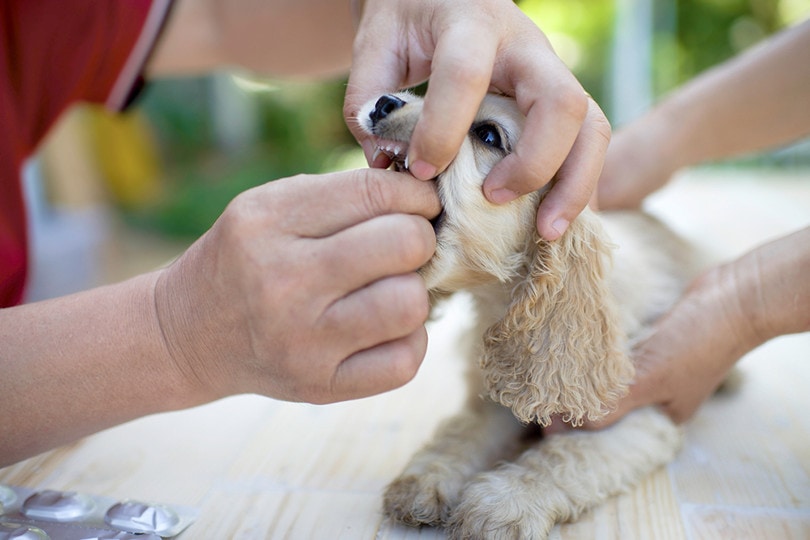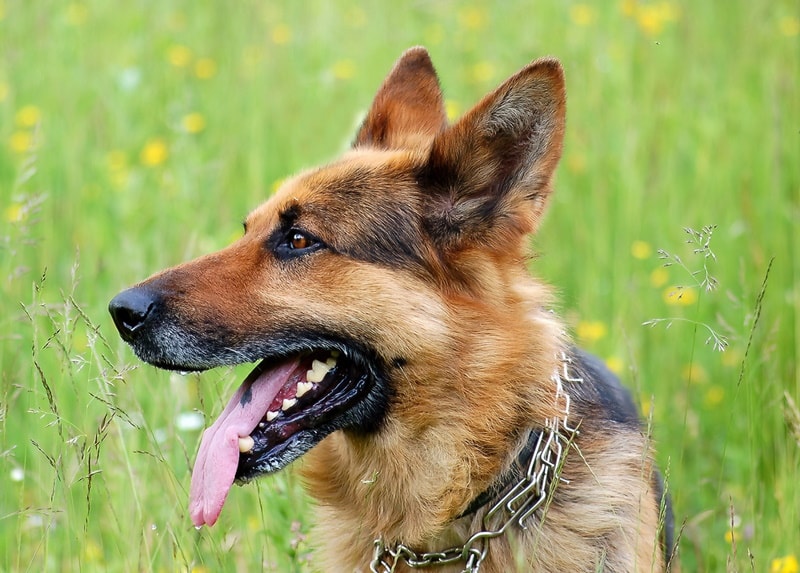Can You Give a Dog Benadryl To Calm Them Down? Vet Reviewed Reasons
Updated on

When your furry friend is sick, scared, or anxious, it can be all too tempting to reach into the medicine cabinet for something to help them feel better.
While it may be tempting, it’s also dangerous, as dogs and humans don’t react to medicines in the same way. One of the most common questions we see is whether it’s okay to give your dog Benadryl to calm them down.
The answer is a firm no unless your vet tells you it’s okay. While your vet may use Benadryl to treat your dog’s allergies, travel anxiety, and motion sickness, that doesn’t mean it’s safe for you to pull it out of your cabinet and give it to your canine pal yourself.
There’s too much that we don’t know about giving medicines to our pets. We’ll tell you all about Benadryl, why you shouldn’t give it to your dog, and more in the article below.
Can You Use Benadryl To Relieve Anxiety and Phobias in Dogs?

Benadryl is an antihistamine that is used to treat allergies. The medicine blocks the effects of a substance called histamine in your body. This substance is released by your dog’s immune cells during allergic reactions against things like insect bites and bee stings, and it is responsible for the unwanted signs of allergies such as itching, redness and swelling of the skin. It is not meant to be used for anxiety or hyperactivity in dogs.
Vets may also use it to decrease or prevent the severity of one type of vaccine reaction that some dogs have. But should it be used to calm your dog down? No, it shouldn’t. If your dog is showing signs of an anxiety disorder, the main thing you need to do is try to understand what triggered the situation in the first place. If you continue reading, you will find other ways to help your dog with their issue.
What Are the Dangers of Giving Benadryl to Your Dog?
As with any medication, you should only use Benadryl if it has been prescribed by your vet for your pet’s specific needs. There are dangers to giving Benadryl to your dog without your vet’s oversight. The drug has several side effects, can interact with other medications your dog might be taking, and is contraindicated in certain medical conditions.
In short, if you think you need something to relieve your dog’s anxiety and phobias, it’s best to contact your vet for a checkup and recommendations. Until you get the appointment with your vet, we’ll give you a few methods for calming your dog down below that might work for you.
Ways to Ease Your Dog’s Anxiety Without Benadryl
There are a few ways you can help your dog’s anxiety while you decide whether the problem needs intervention from a behaviorist or your vet.
Noise Machines and Music
As you probably already know, white noise and soft music can help humans ease some anxiety symptoms. The same holds for dogs as well. If your dog suffers from noise-induced phobias, try putting music on your TV or radio while the offending noise is present. White noise machines also work well for this.
Obviously, don’t have the noise machine or music blaring, as that might worsen your dog’s anxiety. However, a constant rhythm to distract the dog from the noise can often work wonders.

Anxiety Vests and Halters
A great garment that you can get for your dog is an anti-anxiety vest. These vests are designed to apply constant, gentle pressure on a dog’s torso, and this pressure helps to calm most dogs. The anxiety vest cradles the canine and allows them to relax when the environment is chaotic or they have to face a stressful situation. It can be helpful for fireworks, thunderstorms, vet visits, separation, or traveling.
Dog-Appeasing Pheromones
Dog-appeasing pheromones are over-the-counter products that may help some dogs. This synthetic pheromone mimics your dog’s natural calming hormones and can modify your dog’s behavior, allowing them to relax. They are available in plug-in diffusers, collars and sprays.
Calming Food Supplements
There are many dog-specific calming food supplements on the market that you can feed your dog to alleviate their anxiety issues. The molecules range from L-Tryptophan, GABA, L-Arginine, Casein, and L-Theanine to a number of herbal ingredients like Lemon Balm, Passiflora Incarnata, and Valerian.
Prescription Medications
While most pet parents prefer this to be the method of last resort, it is possible that your pup isn’t going to get over its anxiety and phobias using only a behavior modification plan and some of the above tips. Instead, your vet may prescribe medication to help your dog cope.
What Are the Symptoms of Anxiety in Dogs?

Here are the symptoms you can watch out for to determine if your dog is anxious, whether it’s loud noises, thunderstorms, or a fear of traveling.
- Panting
- Trembling
- Increased heart rate
- Loss of bowel and bladder control
- Pacing
- Hiding
- Fleeing
- Wide open eyes
- Defensive aggression
- Barking excessively
- Crouching and laying their ears against their heads
- Tail tight against their body
- Chewing, digging aggressively, or showing other destructive behaviors
If the above tips to calm your dog don’t work, it’s time to make an appointment with your vet. It’s never a good idea to offer any medicine to your dog without your vet’s approval. You want the best for your canine friend, and your dog’s anxiety is a very important topic that can affect their wellbeing if not addressed appropriately. It is always best to try more natural methods; if those don’t work, talk to your vet for further help.
Wrap Up
Dogs have anxiety disorders such as fears and phobias just as we do. Anxiety can be a normal response, but when it is out of context, constant, and/or excessive, it is likely to become a problem for your dog.
If you feel your dog is suffering from anxiety, medicating them with products you have at home is a bad idea. Instead, try the more natural methods above to relieve your dog’s anxiety, and if that doesn’t work, make an appointment with your vet or a veterinary behaviorist.
Featured Image Credit: ponpimonsa_bibi, Shutterstock













